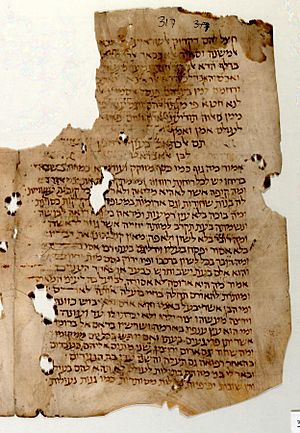Dunash ben Labrat facts for kids
Dunash ha-Levi ben Labrat (born around 920-925 CE, died after 985 CE) was an important Jewish scholar. He lived during a special time called the Golden age of Jewish culture in Spain. Dunash was a poet, a grammarian (someone who studies language rules), and a commentator (someone who explains texts).
He is famous for his book Teshuvot Dunash, which explained language. He also wrote beautiful religious poems like D'ror Yiqra and D'vai Haser.
Contents
Dunash's Early Life and Travels
Dunash was born in Fes, a city in Morocco. His name, Dunash, comes from the Berber language.
When he was young, Dunash traveled far away to Baghdad. He went there to study with a very wise teacher named Saadia Gaon.
After his studies, he returned to Morocco. He became well-known for his poems and for teaching about language and poetry. People even wrote poems about him!
Moving to Spain and New Friendships
Later, a powerful Jewish leader named Hasdai ibn Shaprut invited Dunash to Córdoba. At that time, Córdoba was a major center for culture and poetry in the Islamic world. Hasdai wanted the smartest people to come and live there.
In Córdoba, Dunash met another important language expert, Menahem ben Saruq. However, they didn't get along very well. They had many disagreements about grammar. Dunash also didn't like that Menahem criticized his old teacher, Saadia Gaon.
Their arguments became very personal. They wrote harsh letters and complained about each other to Hasdai ibn Shaprut.
Dunash passed away in Córdoba around the year 990 CE.
Dunash's Important Work
Dunash is known as the person who started a new style of Hebrew poetry in Spain. He was the first to use Arabic meter in Hebrew poems.
New Poetry Style
Traditional Arabic poetry used patterns of long and short sounds. Dunash found a way to use Hebrew sounds (like šəwâ and ḥāṭēp̄) to create similar patterns. This new Hebrew meter became the basis for almost all Hebrew poetry written after him in the Middle Ages.
However, this new style caused a lot of arguments. Many people, especially students of Menahem ben Saruq, criticized Dunash. They thought he was ruining the Hebrew language by using Arabic forms. They felt he was changing traditional Biblical styles to fit Arabic rhythm and rhyming schemes. For example, in his famous poem D'ror Yikra, he changed a word to make it fit the new meter.
Dunash also wrote some of the first known Hebrew riddles.
Contributions to Hebrew Grammar
Dunash's main work in grammar was a book that criticized Menahem ben Saruq's book, Mahberet. Dunash felt Menahem's work went against religious rules and the teachings of wise scholars. He dedicated his book to Hasdai ibn Shaprut.
In his book, Dunash made several important discoveries about Hebrew grammar:
- He was the first to explain the difference between transitive verbs (verbs that need an object, like "kick the ball") and intransitive verbs (verbs that don't need an object, like "sleep").
- He was the first to list verbs by their three-letter roots.
- He also showed the difference between "light" and "heavy" roots in Hebrew words.
- He believed that Hebrew and Arabic languages were related, which Menahem ben Saruq did not see.
Dunash also wrote a book with about 200 questions and disagreements about the teachings of his old mentor, Saadia Gaon.
The Great Debates
Menahem ben Saruq's students strongly attacked Dunash. They criticized him for using Arabic meter and grammar in Hebrew. They also disagreed with his ideas about Jewish philosophy.
Later, Rabbi Abraham Ibn Ezra wrote a response to Dunash's work, defending Saadia Gaon. Then, Yehudi ben Sheshet, one of Dunash's own students, wrote a book defending his teacher against all these critics.
The arguments between Dunash and others were finally settled centuries later. Scholars like Rabbeinu Tam (Rashi's grandson) and Rabbi Joseph Kimhi (father of Rabbi David Kimhi) helped decide these debates. Joseph Kimhi often supported Dunash's ideas.
Even today, some of the questions Dunash raised are still discussed! Dunash is remembered as a great poet and grammarian who helped us understand many important parts of Hebrew grammar.
Poetry by Dunash's Wife
Dunash's wife, whose name we don't know, wrote a poem about Dunash being away from home. This is very special because it's one of the only known Hebrew poems written by a woman during the Middle Ages.
Her poem talks about her love remembering her, and how they exchanged gifts when he left. It also wonders if he would stay in Spain, even if he was offered half the kingdom.
An old manuscript from the 1980s showed that the poem was indeed by Dunash's wife. This manuscript also included an incomplete reply from Dunash to her. In his reply, Dunash promised he would never betray her and spoke of his love.
Another poem, found in 1985, seems to describe Dunash's feelings about leaving his wife. It was written on a letter by Hasdai ibn Shaprut. In it, Dunash expresses sadness about serving Hasdai and mentions leaving his wife and son.
See also
 In Spanish: Dunash ben Labrat para niños
In Spanish: Dunash ben Labrat para niños


